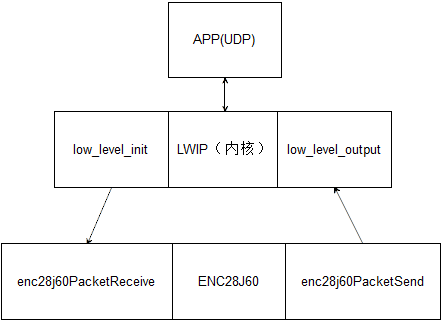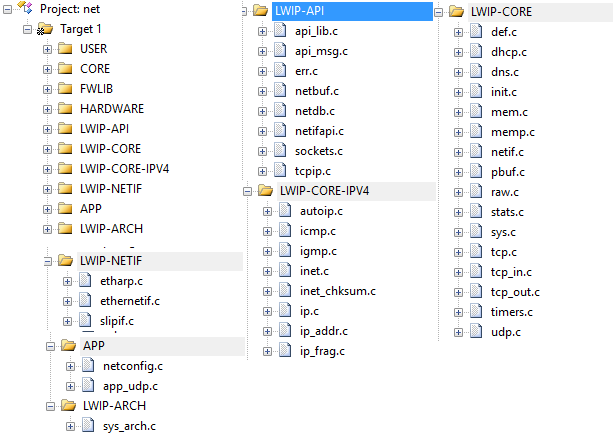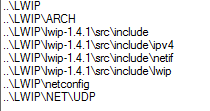这里只是移植,所以LWIP那么多的协议都不需要管,只要知道哪里需要我们修改,为什么修改就可以了。

上图就是整个移植的基本思路,非常清晰的三个层次。其实想想,本质上就是收发数据,只是LWIP协议通过对数据的封装可以实现网络传输。从图中我们就可以看到这里首先需要ENC28J60的驱动,这个驱动需要实现数据的收发,驱动可以在网上找一个。其次就是要移植并修改LWIP协议了。 移植
1.下载LWIP1.4.1和contrib-1.4.1,可以到网上找一个下载,本质上LWIP1.4.1就是LWIP协议的全部,当时我们需要contrib-1.4.1才能完成整个移植。
2.将LWIP1.4.1拷贝到keil新建的工程下面,LWIP下的src是源文件,

在keil工程中添加几个组,LWIP-API,LWIP-CORE,LWIP-CORE-IPV4,LWIP-NETIF,LWIP-ARCH。分别将lwip1.4.1下的src中的api全部文件添加到LWIP-API,中,将core中的文件添加到LWIP-CORE中,将core下的ipv4下的文件全部添加到LWIP-CORE-IPV4,将netif中的文件添加到LWIP-NETIF中。到这里lwip的移植就结束了。

下面就是将H文件添加在keil中了。

3.在lwip的同一目录下,新建ARCH,NET,netconfig文件。在contrib-1.4.1contrib-1.4.1portswin32目录下找到sys_arch.c,在contrib-1.4.1contrib-1.4.1portswin32include找到lwipopts.h和arch文件夹下的文件,将这些文件都拷贝到keil工程中新建的ARCH目录下。在netconfig目录下新建netconfig.c和netconfig.h文件,在NET目录下新建udp_app.c和udp_app.h文件。
4.好了,移植了这么多的文件也是够乱了,现在来解释一下。ARCH中的cc.h文件里是一些数据类型的定义,为了保证平台的无关性,协议栈只使用了自己定义的数据类型,此外cc中还定义了一些调试信息输出的宏。lwipopts.h定义了内核的预编译的宏,有些文件或服务不需要使用,可以改变这个文件中的宏定义取消编译。这个文件是内核的参数配置文件,非常的重要。sys_arch.c文件只有一个sys_now()函数是有用的,其余的都可以注释掉,这里也要修改一下sys_now()函数。其余的文件都不需要修改。


low_level_output函数是传递数据到内核里,我们将enc28j60PacketSend放在里面

新建的netconfig文件就是配置网络参数了,比如ip地址,mac地址,还有最重要的LwIP_Periodic_Handle函数,处理内核的定时函数,如何TCP定时,ARP定时。定时采用systick进行定时,每20ms中断一次,执行一次LwIP_Periodic_Handle。
基本上lwip的移植就结束了。

上图就是整个移植的基本思路,非常清晰的三个层次。其实想想,本质上就是收发数据,只是LWIP协议通过对数据的封装可以实现网络传输。从图中我们就可以看到这里首先需要ENC28J60的驱动,这个驱动需要实现数据的收发,驱动可以在网上找一个。其次就是要移植并修改LWIP协议了。 移植
1.下载LWIP1.4.1和contrib-1.4.1,可以到网上找一个下载,本质上LWIP1.4.1就是LWIP协议的全部,当时我们需要contrib-1.4.1才能完成整个移植。
2.将LWIP1.4.1拷贝到keil新建的工程下面,LWIP下的src是源文件,

在keil工程中添加几个组,LWIP-API,LWIP-CORE,LWIP-CORE-IPV4,LWIP-NETIF,LWIP-ARCH。分别将lwip1.4.1下的src中的api全部文件添加到LWIP-API,中,将core中的文件添加到LWIP-CORE中,将core下的ipv4下的文件全部添加到LWIP-CORE-IPV4,将netif中的文件添加到LWIP-NETIF中。到这里lwip的移植就结束了。

下面就是将H文件添加在keil中了。

3.在lwip的同一目录下,新建ARCH,NET,netconfig文件。在contrib-1.4.1contrib-1.4.1portswin32目录下找到sys_arch.c,在contrib-1.4.1contrib-1.4.1portswin32include找到lwipopts.h和arch文件夹下的文件,将这些文件都拷贝到keil工程中新建的ARCH目录下。在netconfig目录下新建netconfig.c和netconfig.h文件,在NET目录下新建udp_app.c和udp_app.h文件。
4.好了,移植了这么多的文件也是够乱了,现在来解释一下。ARCH中的cc.h文件里是一些数据类型的定义,为了保证平台的无关性,协议栈只使用了自己定义的数据类型,此外cc中还定义了一些调试信息输出的宏。lwipopts.h定义了内核的预编译的宏,有些文件或服务不需要使用,可以改变这个文件中的宏定义取消编译。这个文件是内核的参数配置文件,非常的重要。sys_arch.c文件只有一个sys_now()函数是有用的,其余的都可以注释掉,这里也要修改一下sys_now()函数。其余的文件都不需要修改。
u32_t sys_now()
{
return LocaTime;
}
- 1
- 2
- 3
- 4
- 5

- 1
- 2
- 3
- 4
- 5
static void low_level_init(struct netif *netif)
static err_t low_level_output(struct netif *netif, struct pbuf *p)
static struct pbuf* low_level_input(struct netif *netif)
static void ethernetif_input(struct netif *netif)
err_t ethernetif_init(struct netif *netif)- 1
- 2
- 3
- 4
- 5

- 1
- 2
- 3
- 4
- 5
static void
low_level_init(struct netif *netif)
{
/* set MAC hardware address length */
netif->hwaddr_len = ETHARP_HWADDR_LEN;
/* set MAC hardware address */
netif->hwaddr[0] = macaddress[0];
netif->hwaddr[1] = macaddress[1];
netif->hwaddr[2] = macaddress[2];
netif->hwaddr[3] = macaddress[3];
netif->hwaddr[4] = macaddress[4];
netif->hwaddr[5] = macaddress[5];
/* maximum transfer unit */
netif->mtu = netifMTU;
/* device capabilities */
/* don't set NETIF_FLAG_ETHARP if this device is not an ethernet one */
netif->flags = NETIF_FLAG_BROADCAST | NETIF_FLAG_ETHARP | NETIF_FLAG_LINK_UP;
/* Do whatever else is needed to initialize interface. */
enc28j60Init(netif->hwaddr);
}- 1
- 2
- 3
- 4
- 5
- 6
- 7
- 8
- 9
- 10
- 11
- 12
- 13
- 14
- 15
- 16
- 17
- 18
- 19
- 20
- 21
- 22
- 23

- 1
- 2
- 3
- 4
- 5
- 6
- 7
- 8
- 9
- 10
- 11
- 12
- 13
- 14
- 15
- 16
- 17
- 18
- 19
- 20
- 21
- 22
- 23
low_level_output函数是传递数据到内核里,我们将enc28j60PacketSend放在里面
static err_t
low_level_output(struct netif *netif, struct pbuf *p)
{
struct pbuf *q;
unsigned int i = 0;
#if ETH_PAD_SIZE
pbuf_header(p, -ETH_PAD_SIZE); /* drop the padding word */
#endif
for(q = p; q != NULL; q = q->next) {
/* Send the data from the pbuf to the interface, one pbuf at a
time. The size of the data in each pbuf is kept in the ->len
variable. */
memcpy(&Tx_Data_Buf[i], (u8_t*)q->payload, q->len);
i = i + q->len;
}
enc28j60PacketSend(i,Tx_Data_Buf); //·¢ËÍÊý¾Ý°ü
#if ETH_PAD_SIZE
pbuf_header(p, ETH_PAD_SIZE); /* reclaim the padding word */
#endif
LINK_STATS_INC(link.xmit);
return ERR_OK;- 1
- 2
- 3
- 4
- 5
- 6
- 7
- 8
- 9
- 10
- 11
- 12
- 13
- 14
- 15
- 16
- 17
- 18
- 19
- 20
- 21
- 22
- 23
- 24
- 25
- 26
- 27

- 1
- 2
- 3
- 4
- 5
- 6
- 7
- 8
- 9
- 10
- 11
- 12
- 13
- 14
- 15
- 16
- 17
- 18
- 19
- 20
- 21
- 22
- 23
- 24
- 25
- 26
- 27
static struct pbuf *
low_level_input(struct netif *netif)
{
struct pbuf *p, *q;
u16_t len;
unsigned int i =0;
/* Obtain the size of the packet and put it into the "len"
variable. */
len = enc28j60PacketReceive(1520 *4, Data_Buf);
if(len == 0) return 0;
#if ETH_PAD_SIZE
len += ETH_PAD_SIZE; /* allow room for Ethernet padding */
#endif
/* We allocate a pbuf chain of pbufs from the pool. */
p = pbuf_alloc(PBUF_RAW, len, PBUF_POOL);
if (p != NULL) {
#if ETH_PAD_SIZE
pbuf_header(p, -ETH_PAD_SIZE); /* drop the padding word */
#endif
/* We iterate over the pbuf chain until we have read the entire
* packet into the pbuf. */
for(q = p; q != NULL; q = q->next) {
/* Read enough bytes to fill this pbuf in the chain. The
* available data in the pbuf is given by the q->len
* variable.
* This does not necessarily have to be a memcpy, you can also preallocate
* pbufs for a DMA-enabled MAC and after receiving truncate it to the
* actually received size. In this case, ensure the tot_len member of the
* pbuf is the sum of the chained pbuf len members.
*/
memcpy((u8_t*)q->payload, (u8_t*)&Data_Buf[i], q->len);
i = i + q->len;
}
#if ETH_PAD_SIZE
pbuf_header(p, ETH_PAD_SIZE); /* reclaim the padding word */
#endif
LINK_STATS_INC(link.recv);
} else {
//drop packet();
LINK_STATS_INC(link.memerr);
LINK_STATS_INC(link.drop);
}
return p;
}
- 1
- 2
- 3
- 4
- 5
- 6
- 7
- 8
- 9
- 10
- 11
- 12
- 13
- 14
- 15
- 16
- 17
- 18
- 19
- 20
- 21
- 22
- 23
- 24
- 25
- 26
- 27
- 28
- 29
- 30
- 31
- 32
- 33
- 34
- 35
- 36
- 37
- 38
- 39
- 40
- 41
- 42
- 43
- 44
- 45
- 46
- 47
- 48
- 49
- 50
- 51
- 52
- 53
- 54

- 1
- 2
- 3
- 4
- 5
- 6
- 7
- 8
- 9
- 10
- 11
- 12
- 13
- 14
- 15
- 16
- 17
- 18
- 19
- 20
- 21
- 22
- 23
- 24
- 25
- 26
- 27
- 28
- 29
- 30
- 31
- 32
- 33
- 34
- 35
- 36
- 37
- 38
- 39
- 40
- 41
- 42
- 43
- 44
- 45
- 46
- 47
- 48
- 49
- 50
- 51
- 52
- 53
- 54
新建的netconfig文件就是配置网络参数了,比如ip地址,mac地址,还有最重要的LwIP_Periodic_Handle函数,处理内核的定时函数,如何TCP定时,ARP定时。定时采用systick进行定时,每20ms中断一次,执行一次LwIP_Periodic_Handle。
基本上lwip的移植就结束了。